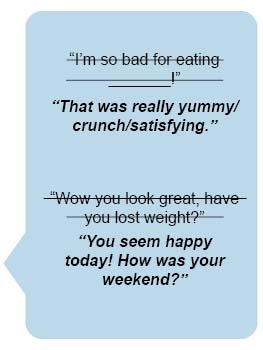Feb 1-7, 2023 is Eating Disorders Awareness Week in Canada. A significant number of youth report dieting to try to lose weight, and more are struggling with disordered eating than ever before.
We are bombarded by messages, including diet trends promoted on social media, that suggest healthy eating is about cutting out specific foods or achieving a certain body size. For youth, trying to “eat healthier” based on this messaging they see can lead to unhealthy eating attitudes and behaviours.
Healthy eating should include having a positive relationship with food and our bodies. In contrast, we know that weight loss diets can harm our physical and mental health. Diets are often disguised and promoted as “self-care” or “healthy lifestyles.” The table below can help highlight the difference between healthy eating and dieting (unhealthy eating).
| Healthy Eating | Dieting (unhealthy eating) |
|---|---|
| Enjoying a variety of foods that are meaningful and available to you. | Following strict food rules, cutting out specific foods or an entire food group. |
| Trusting your body's cues of hunger, fullness, and satisfaction. | Controlling portions, counting calories, thinking about "earning" or "working off" food. |
| Recognizing food's role in providing pleasure, social and cultural connection, and nutrition. | Viewing food only as fuel or nutrients. |
| Not attaching moral value to food choices. | Labeling foods as good/bad, "junk," red light/green light foods, etc. |
| Feeling positively or neutrally about eating. |
Feeling guilt or shame when eating certain foods. |
| Recognizing that bodies are naturally diverse; health is complex and does not have a "look." | Suggesting only certain bodies can be healthy (e.g., thin or muscular, abled bodies. |
| Taking some time to plan your meals and snacks. | Constantly thinking about food, weight, or your body. |
So, what can we do to support youth to truly eat well? Here are some ideas:
Challenge harmful messages about food and bodies
- Encourage youth to talk openly about what they are seeing and hearing on social media or in their peer group. Support critical thinking with questions like, “Who created this message, and what is their angle?” “Are they trying to sell you something?” “Do they suggest there is one “right” way to eat or look?”
- Try calling out food or body shaming as it appears in the media – the more they notice it, the more they can challenge it!
- Help youth explore strategies for reducing their exposure to diet culture; for example, by unfollowing an account or changing social media settings to filter out weight loss ads.
Role model positive relationships with food and bodies

- Lead by example. We send a powerful, positive messages to youth when we refuse to engage in diet talk and when we show that we enjoy a variety of food.
- Aim to talk about food in neutral or positive ways. Avoid placing moral value on food choices or discussing weight loss diets, calorie counting, and “cheat days.”
- Avoid commenting on bodies. Consider that complimenting weight loss implies that larger bodies are inherently bad, unhealthy, or unworthy, and may reinforce disordered behaviours. Instead, emphasize actions or inner qualities.
Finally, be kind with yourself and others as you unlearn diet culture
We have all grown up with diet culture and it takes courage and practice to spot it and reject it. Sometimes it may not feel safe to do so, and that is completely okay. Working on figuring things out together with youth in your life can build trusting relationships – which is protective in itself!
If you want to learn more, or are worried that someone you know is struggling with disordered eating, these websites may help:














Comments